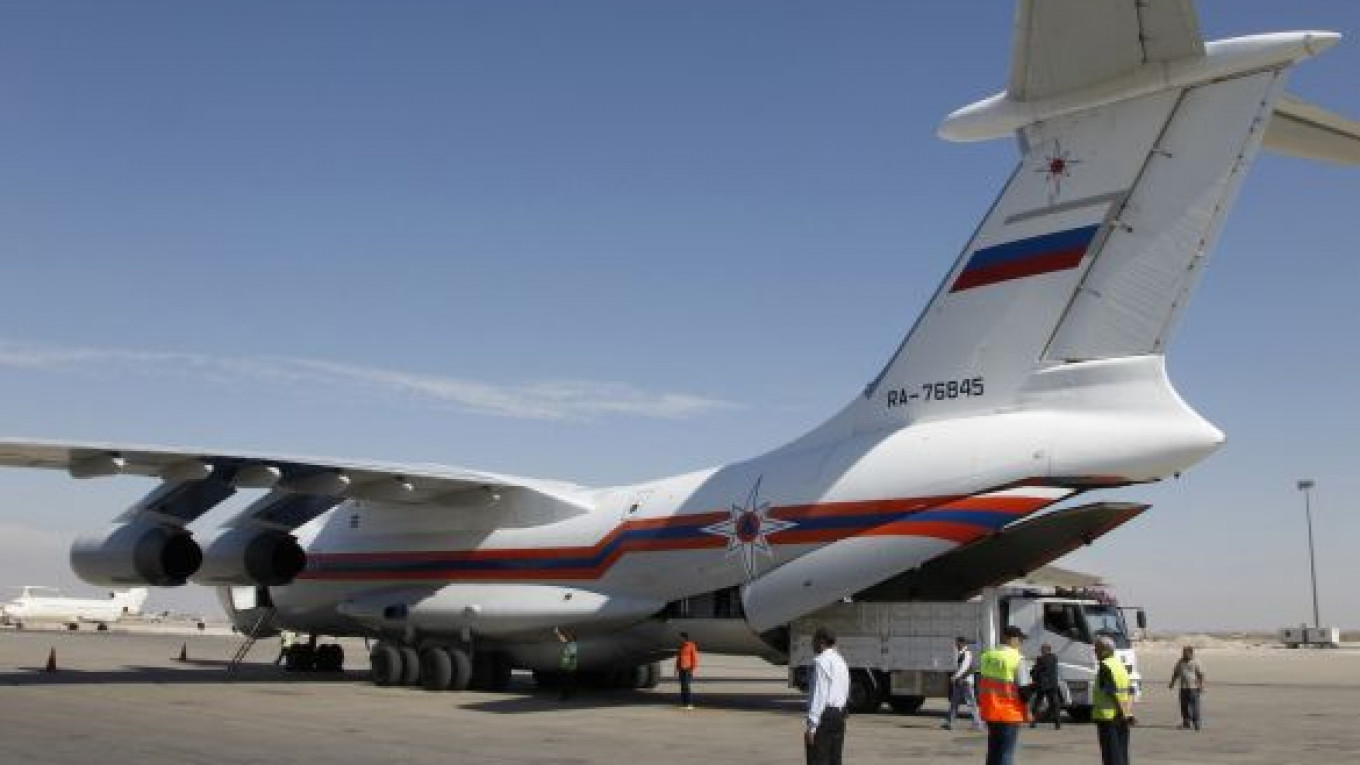Russia has moved closer to commercial production of a military transport aircraft that will rival the Boeing C-17 Globemaster.
A demonstration flight of the upgraded Ilyushin-76 airlifter took place as President Vladimir Putin looked on late last week.
Russia has been working toward domestic production of an improved version of the airliner ever since it concluded in 2005 that efforts to assemble it in Uzbekistan had failed.
Following the flight Thursday, the Defense Ministry signed a contract with the plane-maker, United Aircraft Corp., to buy 39 craft worth 140 billion rubles ($4.5 billion).
Putin described the agreement as the biggest single deal for the Russian aircraft industry since the Soviet break-up, and he noted that only the United States manufactured similar airlifters.
"Incidentally, no other country, as a matter of fact, except us and our American partners, produces this type of machine for now," he said at an industry meeting in Ulyanovsk.
Previously, one of the biggest contracts for Russian airliners came from Aeroflot, which placed a firm order for 30 Sukhoi Superjets, estimated to be worth more than $820 million.
The new Ilyushin-76, officially referred to as Ilyushin-476 or Ilyushin-76MD-90A, is 1.5 meters longer than its predecessor and has a larger airlift capacity, more energy-efficient Russian engines, a digital dashboard and better wings. It can also fly longer distances.
The Defense Ministry is using Ilyushin-76s that are at least 20 years old and whose service life is on the verge of expiring, said Vasily Kashin, an expert at the Center for the Analysis of Strategies and Technologies, a research institution.
The government, including the Emergency Situations Ministry, the Interior Ministry, the Transportation Ministry, the Federal Security Service and the presidential administration, will order a further 100 of the planes to be delivered by 2020, said Sergei Ivanov, the Kremlin chief of staff. The airliner is convertible into a firefighting plane or a flying clinic, he said.
Additional orders could come from the country's private cargo companies. Ivanov said Ilyushin-76s are widely used commercially for shipping flowers to Moscow — presumably from the Netherlands — seafood from the Far East and salmon from Norway.
Russia decided to move production to Ulyanovsk after it had to cancel a contract with China for the airliners because the plant in Tashkent, Uzbekistan, couldn't assemble them, Kashin said. United Aircraft Corp. will use its Aviastar-SP unit in Ulyanovsk to produce the aircraft.
Ivanov said China and India could still be interested in a deal.
The newer Ilyushin-76s will begin rolling off the line in 2014, the Defense Ministry said.
Kashin said the United States is politically finicky about its arms exports, leaving the door open for Russia to export to countries like China.
China is developing its own airlifter of a similar class, the Y-20, but still has a long way to go, Kashin said.
Boeing exported some of its C-17's to Britain and the United Arab Emirates earlier this year.
Related articles:
A Message from The Moscow Times:
Dear readers,
We are facing unprecedented challenges. Russia's Prosecutor General's Office has designated The Moscow Times as an "undesirable" organization, criminalizing our work and putting our staff at risk of prosecution. This follows our earlier unjust labeling as a "foreign agent."
These actions are direct attempts to silence independent journalism in Russia. The authorities claim our work "discredits the decisions of the Russian leadership." We see things differently: we strive to provide accurate, unbiased reporting on Russia.
We, the journalists of The Moscow Times, refuse to be silenced. But to continue our work, we need your help.
Your support, no matter how small, makes a world of difference. If you can, please support us monthly starting from just $2. It's quick to set up, and every contribution makes a significant impact.
By supporting The Moscow Times, you're defending open, independent journalism in the face of repression. Thank you for standing with us.
Remind me later.






